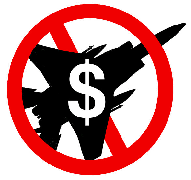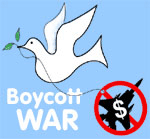"NO BLOOD ON OUR MONEY!" Read the Boycott War campaign platform Visit the Boycott War Design Gallery Alternatives to War-based Economics and Bloodstained Corporations Take the BOYCOTT WAR! Power Quiz ®
BOYCOTT WAR The United States leads the world in both oil consumption and weapons sales.
|
THE BOYCOTT WAR CAMPAIGN If you want to don't want corporations or governments to use your money to finance war then don't let them. You can choose to boycott countries or companies who profit from conflict, conquest, and suffering. If you do so, you certainly won't be alone. Boycotts against the war are a fast-growing global movement. Various campaigns to oppose the United States and Great Britain's illegal invasion of Iraq began spontaneously and independently of each other. Many of them started simultaneously across the world as soon as it became known in September 2002 that the U.S. had definitive plans to invade Iraq with or without the support of the United Nations. The various campaigns have a range of titles (Boycott Bush, Boycott-Made-in-USA) and range of approaches which can involve everything from a general shopping boycott of U.S. transnational corporations (Boycott Brand America) to redirecting a certain amount of taxes to anti-war activism (Axis of Peace), from online petitions (Boycott Oil) to offering alternative approaches and letting individuals choose themselves (IDEA). Often campaigns target corporate symbols of the U.S. and/or companies that have particular ties to the war industry (or to some aspect of the U.S. military-industrial complex) or George W. Bush and his Republican Party. Some war-connected companies (like General Electric) have a weak presence in many countries and the most serious offenders (like Lockheed Martin and Boeing) do not sell consumer products at all. Ultimately each campaign will have to be shaped after the specific character of its organizers and the country/locality they live in. For technical and ethical issues of boycotting see either the FAQ or the essay on the The social and moral aspects of boycott campaigns. Whatever the differences between the various boycott campaigns - there is a refreshing commonality: people across the world are connecting the global economy to their local consumption and saying "Enough! We won't pay for your war anymore!" |


